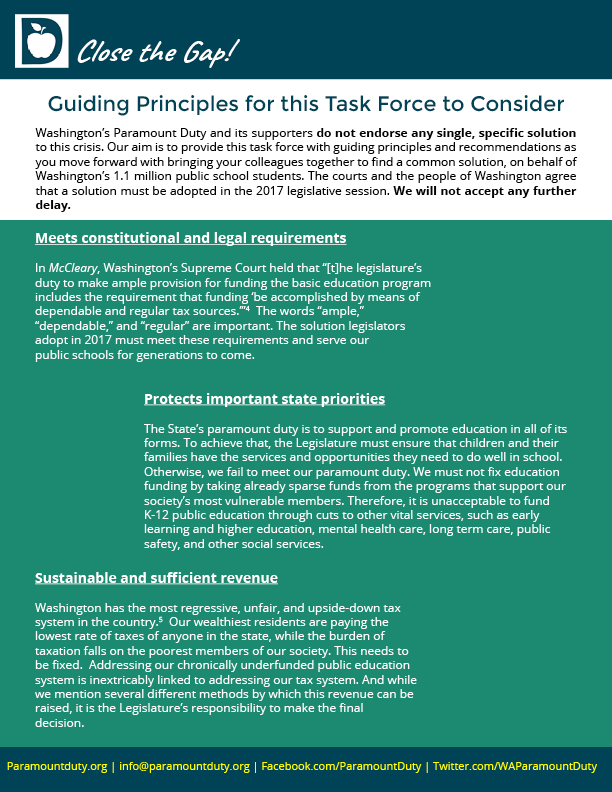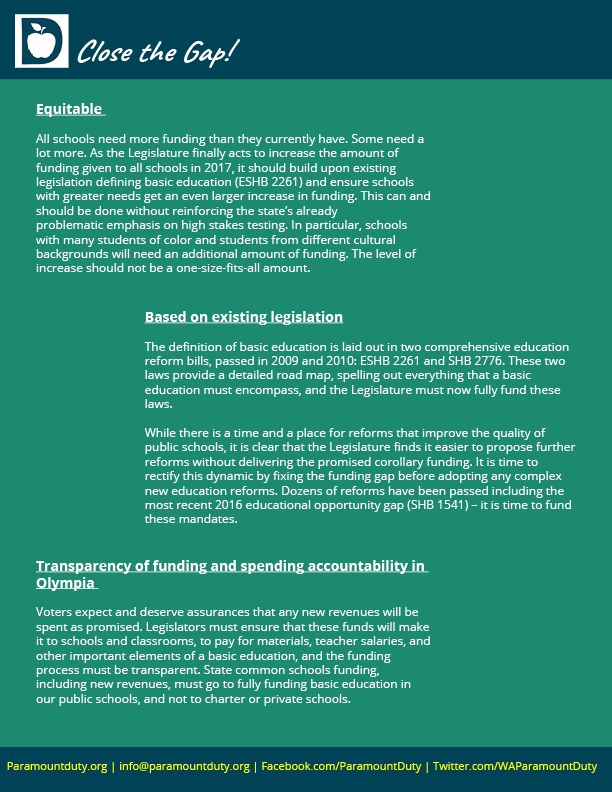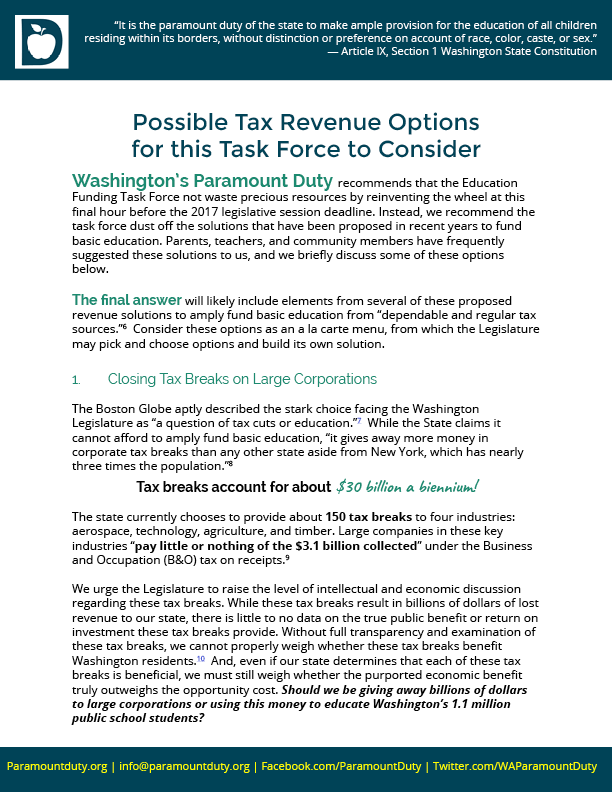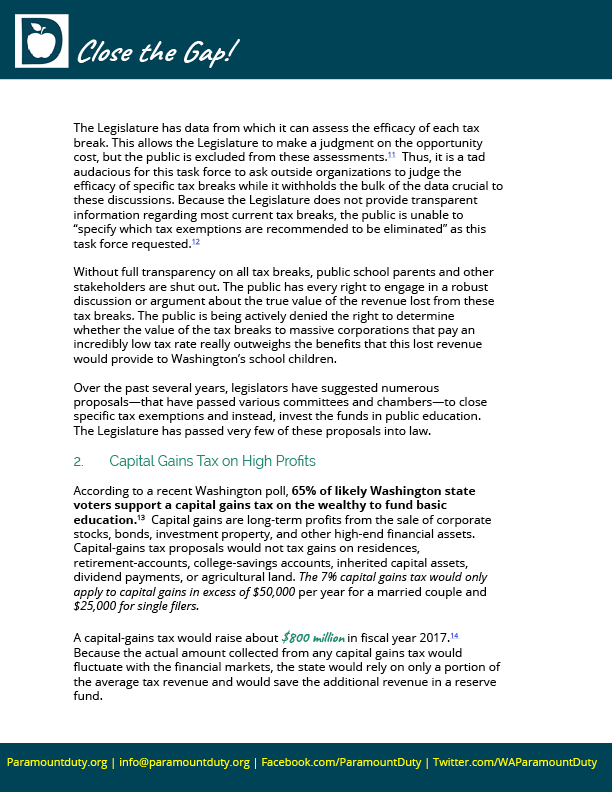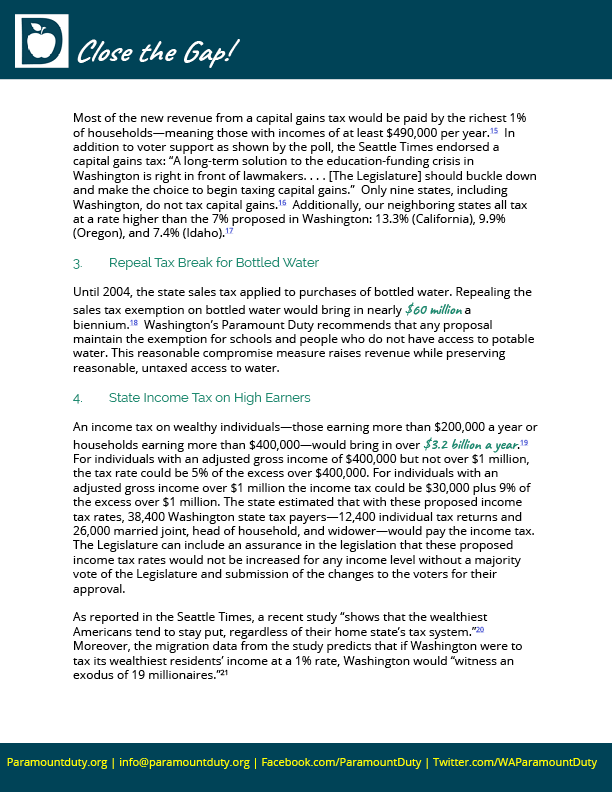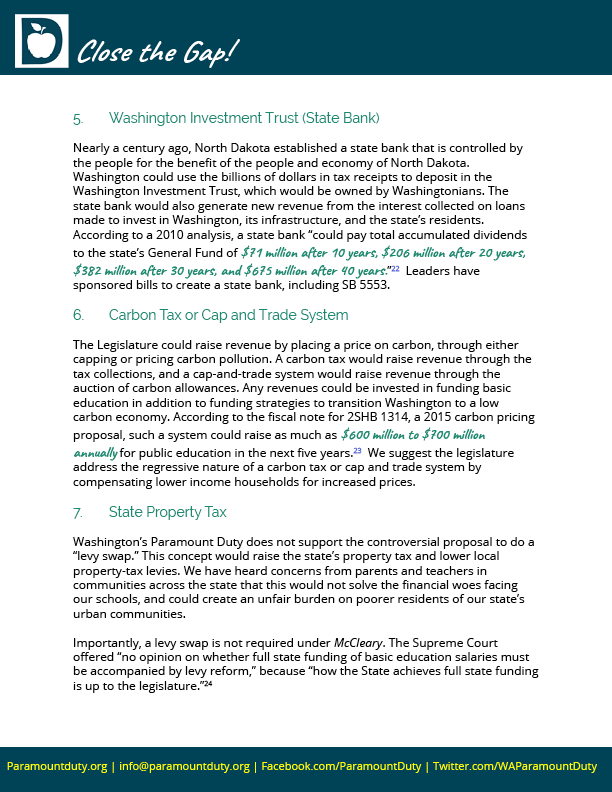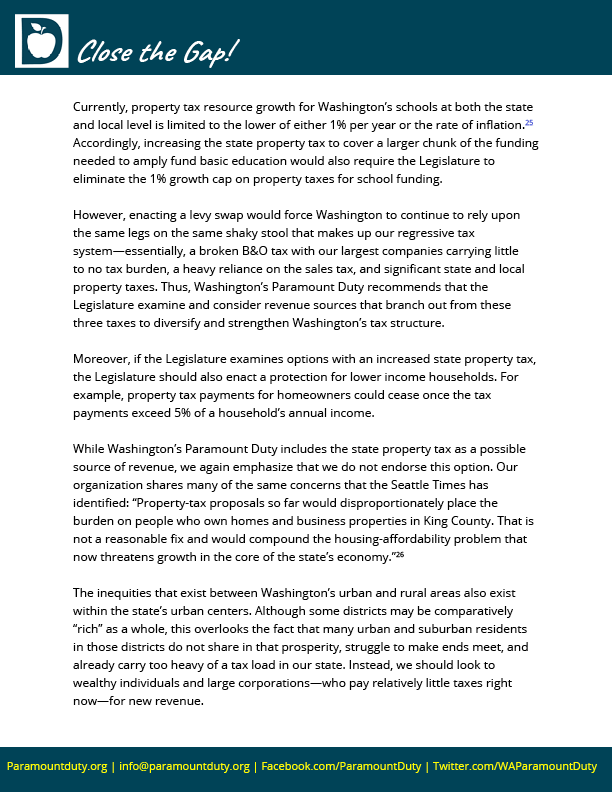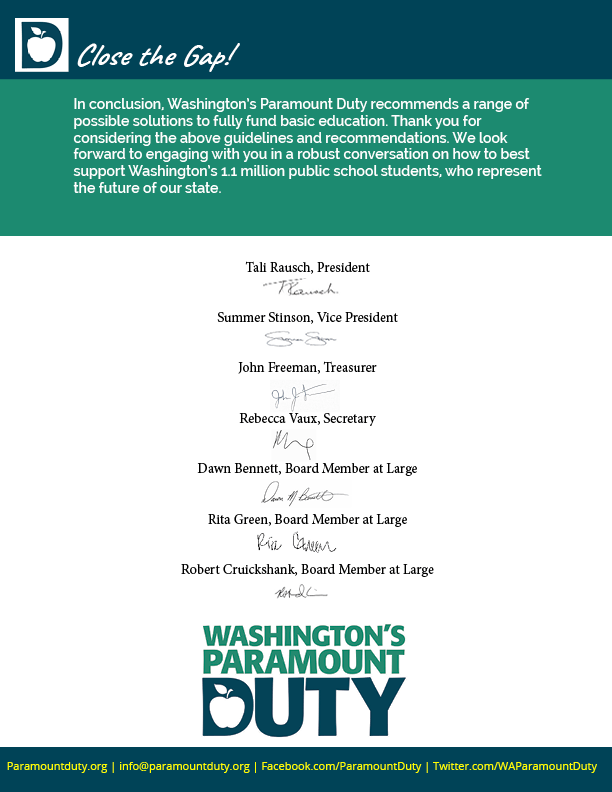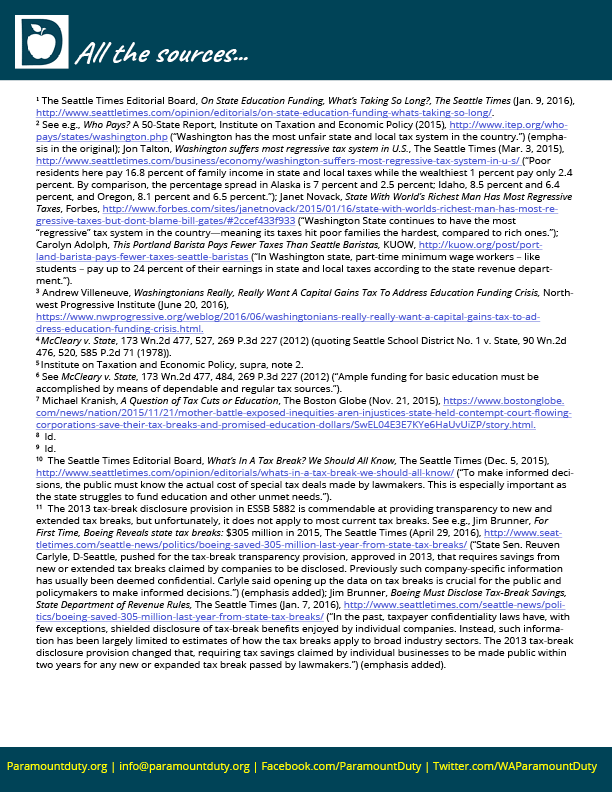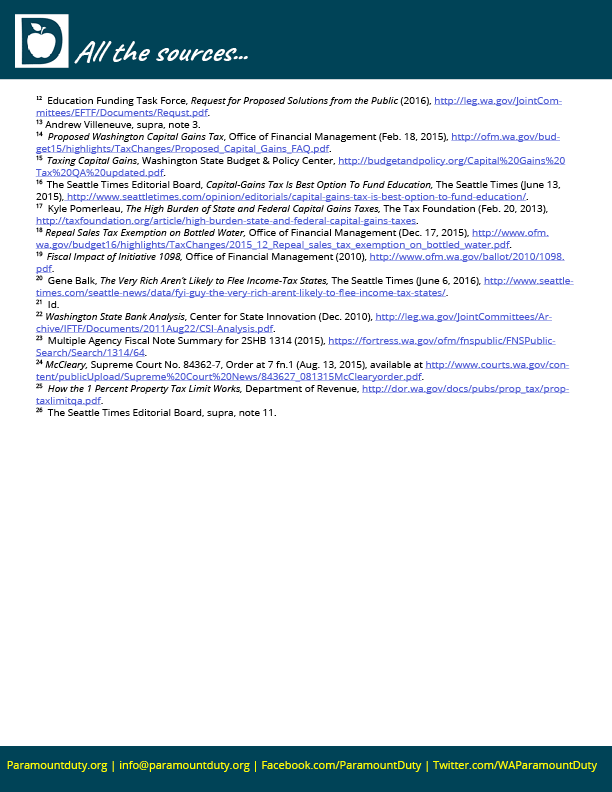Category: BLOG
POSTS & TUTORIALS
Candidates for Fully Funding Education
Aaron Moreau-Cook, Candidate for Representative for the House in the 1st LD
"Fully Fund Education – We need an honest plan to increase revenues to pay for education, without impacting other social services, to meet the McCleary Supreme Court ruling of 2012. Investing in education today means that Washington will have a thriving middle class for decades to come."
http://mltnews.com/election-watch-2016-candidate-qa-state-rep-district-1-pos-2/
Representative Luis Moscoso, Candidate for Senate in the 1st LD
“The Legislature must end reliance on local levies to pay teachers. That’s the final goal we must reach in to keep our promise of fully funding education.”
http://housedemocrats.wa.gov/luis-moscoso/legislative-update-from-rep-moscoso-education-transportation/
Representative Derek Stanford, 1st LD
“The Supreme Court has made it clear: We need to make education a higher priority in our state budget. I’ve worked to keep our commitment to our public schools by supporting early learning, supporting local control of our schools, simplifying testing, while recruiting and retaining high-quality teachers. I am excited to stay on the front lines supporting excellent public schools.”
http://derekstanford.com/?page_id=138
Shelley Kloba, Candidate for the House in the 1st LD
“People want great schools because they know education is the key to our prosperity. We have defined basic education and we know what it costs. Now we have to make the investments that pay off in the bright futures of our children.”
http://www.heraldnet.com/news/education-economy-top-issues-for-1st-district-candidates/
Amy Pivetta-Hoffman, Candidate for the House in the 2nd LD
“We need to fully-fund basic k-12 education and we need a plan to fix our over crowded local schools and classrooms.”
-Literature produced by Friends to Elect Amy Pivetta Hoffman
Senator Andy Billig, 3rd LD
Sen. Andy Billig, D-Spokane, said the action by the end of the 2017 legislative session is "key" because "it keeps our promises to Washington's one million school children and has the best chance of getting us out of contempt of court."
http://www.kentreporter.com/news/369000591.html
"The court gave us a clear to-do list. It identified several key areas that need additional funding: reducing class sizes for grades K-3, implementing all-day kindergarten statewide, and paying for classroom materials, supplies, and operating and transportation costs. But if we want to fulfill our obligation to provide for our children’s education, we have to do more than just pay for smaller class sizes and more textbooks."
http://www.spokesman.com/stories/2013/apr/20/children-need-holistic-plan/
Representative Tim Ormsby, 3rd LD
“We’ve got to get our budget priorities straightened out because we’ve got a lot of pressures on the budget related to our obligations to meet our constitutional responsibilities for funding education as our paramount duty.”
"Our paramount duty is ensuring all students have an equal opportunity to learn."
http://housedemocrats.wa.gov/values/
Senator Mark Mullet, 5th LD
"The Supreme Court has called for the Legislature to drastically reform the way our schools are funded, especially in regard to reliance on local levies. I firmly believe that local levies are a crucial and important part of how we fund our schools. If a local community wants to put more money into its schools, it should have the right to do so and the state shouldn’t stand in its way. Voters in the 5th District have consistently approved local school levies. As a result, we have some of the best teachers in the state, outstanding graduation rates and state-of-the-art facilities. Let’s get creative and find a way to make local levies a part of the solution, not a part of the problem."
http://sdc.wastateleg.org/mullet/2016/02/03/e-news-make-local-levies-a-part-of-the-solution/
Representative Chad Magendanz, candidate for Senate in the 5th LD
"After years of failing to fulfill that duty, the state Supreme Court, in its McCleary decision, called the Legislature to account and ordered us to fully fund K-12 education by 2018. Complying with McCleary is a daunting task, but also a great opportunity.... It is our sincere hope that the state Senate will join us in passing this bill so we can keep up a steady momentum on our paramount duty: education."
Bellevue Reporter Op-Ed dated 3/6/2014 by Reps. Tana Senn & Chad Magendanz.
Darcy Burner, Candidate for the House in the 5th LD
“I support expanding access to high quality early childhood education, smaller class sizes, better pay for teachers, and more support for college or vocational training. We need to fully fund education in Washington. The fact that the state legislature is now in contempt for its failure to do so is shameful. Let's put children first and fully fund our schools.”
http://www.darcyburner.com/issues
Angela Homola, Candidate for the Senate in the 10th LD
“I will commit to supporting legislation that moves our state toward a robust, fair and affective educational system; legislation that secures funding by closing tax loopholes. We must stop kicking the can down the road. “
http://www.angieforpeople.com/angie-homola-campaign-news
Representative Norma Smith, 10th LD
“Every student deserves the opportunity to have a quality education and to be prepared for success. The Washington state constitution is clear; providing for the basic education of all children within our borders is the paramount duty of the legislature in the budgeting process. For far too long, budget leaders in Olympia put education on the chopping block first, when it is clear that adequately funding education should be priority number one.”
http://votenormasmith.com/issues/education/
Senator Bob Hasagawa, 11th LD
“Among other things, Superintendent Dorn points out that the budget’s $955 million increase in education funds is only about two-thirds of the $1.4 billion that is actually needed to fully fund education for the biennium. What’s more, the budget once again punted on funding voter-approved initiatives to lower class sizes and increase teacher pay; if Republicans had honored the will of the people and covered those expenses, that cost would have reduced the overall increase in funds available to satisfy the McCleary requirements to just $500 million. In other words, the teachers themselves are self-funding a large portion of the additional money we’re putting into basic education.”
http://bobhasegawa.com/funding-education/
Tim Probst, candidate for the Senate in the 17th LD.
"It is our paramount duty to fully fund education!"
"Invest in education"
https://www.facebook.com/ElectTimProbst/?fref=ts
Representative Ann Rivers, 18th LD
“Education is the paramount duty of state government. Every problem we face from crime, the economy, jobs, healthcare, even the environment, can be improved by a properly funded and professional public education system."
And…
"Some in Olympia would like to leverage funding for schools with new taxes. But holding back on funding education unless there are massive tax increases is not only bad for education, it’s unconstitutional. Kids deserve our first dollar, not budgetary leftovers.”
http://annrivers.com/issues/
Kathy Gillespie, Candidate for the House in the 18th LD
“Fully fund basic education and end use of local school taxes to pay Olympia's bills.”
http://www.electkathygillespie.com
Teresa Purcell, Candidate for the House in the 19th LD
“Access to excellent public education has been a great equalizer for people from all walks of life. If an individual works hard, for decades they have been able to create and access opportunity for a brighter future. We are at a moment in time where that promise is not being kept for students throughout our state, and especially in our small towns and rural communities. We must restore that promise. I am a proud graduate of Longview Public Schools, along with my 8 brothers and sisters. When I was in school here, Washington’s school system used to be the envy of the nation, but decades of inaction have left us with a situation where the Washington State Supreme Court has ruled that the State Legislature is not meeting its “paramount duty” of properly funding education, holding the Legislature in Contempt of Court, and fining taxpayers over $29 million in the past year due to the Legislature’s inaction and failures.”
http://peopleforpurcell.com/issues/
Senator John Braun, 20th LD
“Looking ahead at the upcoming legislative session, we have more work to do to make the right investments for our students and provide a more equitable solution for school funding by the 2018 deadline. As we continue to prioritize schools in our state there will be many issues to address, but funding is a major piece of the puzzle.”
http://johnbraun.src.wastateleg.org/sen-brauns-e-newsletter-october-6-2015/
Beth Doglio, Candidate for the House in the 22nd LD
"We should substantially increase funding for K-12 as well as for higher education."
http://bethdoglio.nationbuilder.com/issues
Laurie Dolan, Candidate for the House in the 22nd LD
“K-12 education is the paramount duty of Washington State, yet under the current regressive tax system, adequate funding is impossible. If a state income tax is not politically feasible, we should focus on a capital gains tax which would impact only the most wealthy. Although the Democrats in the Washington Legislature have written these proposals, they have never been passed. We must fund education, but not on the backs of teachers, state workers, seniors, and vulnerable citizens. A statewide systemic effort to educate voters on the necessity for a new funding stream for education is urgently needed.”
http://friendsoflauriedolan.com
Representative Sam Hunt, Candidate for Senate in the 22nd LD
“The Washington State Constitution says, “It is the paramount duty of the state to make ample provision for the education of all children residing within its borders, without distinction or preference on account of race, color, caste, or sex.””
“The State Supreme Court has reaffirmed this provision in its McCleary decision that states the Legislature is not meeting its constitutional duty. The Legislature has until 2018 to fulfill this mandate. As a Senator, I will advocate for legislative actions to adequately address this funding crisis. That includes being willing to vote for additional taxes.”
“Addressing the funding issue creates a steep hill to climb. It will take at least $3 billion new dollars. I am not willing to see the rest of state government suffer huge cuts in order to meet our commitment to K-12 education.”
Senator Christine Rolfes, 23rd LD
"We need to make sure that all children, across the state, are getting the quality education that our state constitution mandates," said Rolfes. "As a member of these committees, I look forward to working with my colleagues to identify and fund proven, sustainable solutions for improving achievement for all students."
http://sdc.wastateleg.org/rolfes/2013/08/01/rolfes-named-to-select-education-committees/
Representative Kevin Van de Wege, Candidate for Senate in the 24th LD
“We must meet our constitutional duty to fully fund public education. For too long, the legislature has debated how to solve this problem and Senate Republicans have dragged out that debate. My wife is a high school teacher here in Sequim and as the father of two children in our public schools, I know first-hand the time to act is now. We need to work together to solve our funding crisis and put an end to partisan games. I will work with my colleagues on both sides of the aisle to find common ground and move the Senate toward a solution that works for our kids.”
http://kevinvandewege.nationbuilder.com/issues
Representative Steve Theringer, 24th LD
“I am not a constitutional lawyer, so I can’t speak to the whether or not the State Supreme Court should have found the Legislature in contempt of court for not amply funding education, but I do think the State needs to increase the amount of funding we are providing for education. If the other Washington would pass the Main Street Fairness Act, closing the sales tax exemption on internet sales, not only would it generate $450 million for the State of Washington a year, but it would also help out our struggling local brick and mortar stores. Other revenue options: a levy swap, where the State assumes local property taxes. Enacting an excise tax on capital gains; we are one of eight states that does not have one. Expanding the B&O tax on a broader range of services.”
http://thedailyworld.com/news/local/qa-24th-district-steve-tharinger-and-thomas-greisamer
Jamie Smith, Candidate for the House in the 25th LD
“Our state faces tough choices in the near future. Our public schools desperately need support to provide the best education to our children.”
https://www.votejamiesmith.com
Michelle Chatterton, Candidate for the House in the 25th LD
“We’re never going to fully-fund our schools or build the communities we want to live in if we keep sending the same career politicians back to Olympia. We need legislators willing to break from the mistakes of the past and make the tough choices on K-12 education funding. We need leaders in Olympia who understand that every family deserves a fair shot at a decent life, not just a lucky few.”
http://www.michellechatterton.org/announcement
Larry Seaquist, Candidate for the House in the 26th LD
“Up against a Court deadline, being fined $100,000 a day, the Legislature hasn’t done its homework, hasn’t even agreed to a credible plan. Larry lays out a detailed, step-by-step strategy for fully funding the complete system of public education our state must have in this high skills, high competition world.”
http://www.larryseaquist.com/apple-action-agenda/
Senator Jeannie Darnielle, 27th LD
“PRIORITIZING EDUCATION- As a mother I know how critical our public schools are for preparing our children for the future. Fully funding education is always a priority of mine and especially following the McCleary decision it will be important that our school districts receive the funding they need to be successful.”
http://arcwa.org/resources/Jeannie_Darneille_D_27.pdf
Representative Laurie Jenkins, 27th LD
"I believe that we need a tax system that is fair, adequate and stable."
"As a PTA mom, I am dedicated to investing in our K-12 schools too. Even during the tough economy, our highest priority must be to provide educational excellence and opportunity for every child.”
http://www.lauriejinkins.com/issues
Marisa Peloquin, Candidate for the House in the 28th LD
“Like so many of you, I don't understand why the legislature has taken so long to fully fund our schools. I have been active in my PTA for years and believe our public schools need to be the top priority in our state budget. We have work to do to increase the graduation rate and ensure every student has the great teachers and quality schools that they deserve.”
http://www.marisaforsenate.org/issues
Representative Christine Kilduff, 28th LD
“As your state representative my pledge to you is this: I will work tirelessly to make sure our state legislature is accountable to the people they represent, not just the wealthy or well-connected few.
That means I will fight every day so that:
Our children, who deserve to attend fully and fairly funded public schools, get an outstanding education that outfits them to compete in the global economy.”
http://christinekilduff.com/pages/89
Michael Pelicotti, Candidate for the House in the 30th LD
“Our children are not getting the support they need from Olympia. Legislators are currently being held in contempt by our State Supreme Court for failing to adequately fund our schools. This is unacceptable. Quality education is a right, and is necessary for the future development of our region. Mike will advocate for the funding of schools in our communities to be the paramount duty of the legislature.”
http://www.electmikep.com/read-me/
Kristine Reeves, Candidate for the House in the 30th LD
“I want to be part of the solution that ensures that the same excellent education I received growing up and going through the public school system will be there for my children when they reach the age for school. This includes fully funding our K-12 system in accordance with McCleary - this will be achieved by a multitude of methods including closing corporate loopholes and holding corporations fiscally accountable when they take advantage of tax breaks. Funding itself, however, will not complete my vision for all children in our state. We also need to address youth homelessness, lifting the levy lid, and provide more support and ongoing development for our teachers.”
https://www.washingtonea.org/ourvoice/2016-elections/kristine-reeves/
Representative Mia Gregerson, 33rd LD
“Even in a short session - we support increasing Funding Education”
https://twitter.com/miagregerson33/status/701948403442282497
Representative Tina Orwall, 33rd LD
“From early learning to secondary education, Tina remains committed to providing access to a quality education for all. Understanding the importance of early learning on child development, she works hard to promote policies that protect and expand early learning programs. Tina went to Olympia to fully fund education and has advocated for budgets that retain funding for early learning, K-12 and higher education.”
http://www.electtinaorwall.com/issues/
Representative Eileen Cody, 34th LD
“Fulfilling our paramount duty to the one million school kids in Washington is about more than fully funding schools. We must have the right policies in place that ensure all students have the opportunity to learn and succeed. This budget proposal would increase beginning teacher salaries, expand all-day kindergarten and reduce K-3 class sizes.”
http://housedemocrats.wa.gov/eileen-cody/final-week-of-session/
Representative Joe Fitzgibbons, 34th LD
“The Washington State Constitution tells us that funding K-12 education is the state’s “paramount duty.” And more than just a legal obligation to fund public schools, we have a moral obligation to make sure that all kids are provided the opportunity to learn and succeed. In too many cases, the color of a student’s skin or their zip code determines what opportunities are available. This is not right and it does not build a strong foundation for Washington’s kids to succeed.”
http://housedemocrats.wa.gov/joe-fitzgibbon/what-kind-of-washington-do-we-want-to-live-in/
Irene Bowling, Candidate for the House in the 35th LD
“As a mother of 3 children and a life-long educator, Irene Bowling knows that fully funding our schools has to be a top priority.”
https://irenebowling.com/irenes-priorities/
Craig Patti, Candidate for the House in the 35th LD
“I believe it is past time to address school funding issues mandated by the Supreme Court; why wait until the last-minute? We can no longer kick the can down the road. I’ll make education funding my highest priority, from early childhood through higher education, while insisting on high academic standards that prepare kids with the skills they need to be successful in our new economy. We also need to begin planning for the post-McCleary era to ensure that Washington does not fall behind again.”
https://craigpatti.com/issues/
Senator Reuven Carlyle, 36th LD
“The paramount duty has not been fulfilled. Many factors have contributed to the disjointed, ineffective tax and funding structure we have today, a structure that virtually guarantees inequitable access and outcomes. Unfortunately, longstanding political and social constructs bar meaningful progress. Nothing, over 40 years of legal battles where the State has been consistently been told to address the inadequate and inequitable system, has really changed.
We are so much more as a state than what we’ve become.
There are, in fact, other models that might deliver on the Paramount Duty in a more fulsome way than our top-down, centralized approach.”
https://reuvencarlyle36.com/2015/02/12/rethinking-public-school-funding-back-to-a-new-future/
Representative Noel Frame, 36th LD
“I'm tackling the biggest challenge Washington state has ever faced: fixing our regressive and inequitable tax structure. I’ve been working to fix our broken school funding system since its negative effects hit me personally as a high school student.”
http://www.noelframe.com/issues/
Representative Sharon Tomiko Santos, 37th LD
“Every child in Washington state is guaranteed the right to an equitable education under our state constitution,” said Rep. Sharon Tomiko Santos (D-Seattle), chair of the House Education Committee.
“One size in education does not fit all,” said Santos. “It does not work for all students. Unfortunately, right now the system is designed with this ‘one size fits all’ approach. No matter what their needs, our paramount duty as a legislature is to meet students where they are.”
http://housedemocrats.wa.gov/sharon-tomiko-santos/house-sends-educational-opportunity-gap-bill-to-governors-desk/
Representative Eric Pettigrew, 37th LD
“The opportunity to get a great education shouldn't depend on the color of your skin or the zip code you are born into. In addition to supporting closing the opportunity gap and fully funding K-12 education, I am making sure that students in our local communities get equal access to education.”
http://housedemocrats.wa.gov/eric-pettigrew/2016-legislative-session-report-to-the-37th-district/
Representative Mike Sells, 38th LD
“With a teaching background in both elementary and secondary education with the Everett School District from 1967 to 1998, Mike knows the importance of funding education. As President of the Everett Education Association from 1981 to 1998, he knows how important a good education is, and he has worked to get teachers the tools they need to deliver the kind of education that will help children succeed.”
http://www.mikesells.net/index.html
Representative Kristine Lytton, 40th LD
"It is our responsibility to adequately, accurately and amply fund education."
"The plan we are looking at is to create more data in our districts to determine how much in levy money is being spent."
"All options have to be on the table. Realizing it's a difficult question as to where that revenue is going to come from... these will be difficult political decisions."
Lisa Wellman, Candidate for the Senate in the 41st LD
“I'll put students first and ensure every child can get a great education. I understand that public education is our state's top priority and that great schools lead to an economy that works for all of us.”
Literature paid for by Friends of Lisa Wellman
Thomas Ptichford, Candidate for the House in the 43rd LD
“Healthy communities begin with education. We must meet our constitutional obligation to fully fund basic education. The only way to do this is by building support around meaningful revenue reform. This can happen, but it will require both conducting a public education campaign and reaching across the aisle to come together to be successful.”
http://www.thomaspitchford.com/issues
Daniel Shih, Candidate for the House in the 43rd LD
“As your representative, I will work to properly fund public K–12 education, as required by the state Supreme Court decision in McCleary. The legislature’s failure to do so threatens to have a lasting impact on an entire generation of children who depend on public schools for a basic education. The state must not put this off any longer.”
http://www.danshih.com/issues/
John Lovick, Candidate for the House in the 44th LD
“As Washington looks to fully fund the K-12 public school system, we must be innovative and creative to ensure that our kids are getting a great education and that our teachers are able to earn a fair wage for a fair day’s work. With a limited General Fund, this is not going to be a straightforward or easy process. However, I believe the McCleary ruling was a wake-up call for all of us. We must invest in our education system not only on the State level, but also find a way to ensure that local issues and control are being addressed to create the best public school system our children deserve.
Finding $9.5 billion to completely address the budget shortfall our schools face is going to be difficult, but I am ready to put in the hard work to buckle down and get things done. I believe we must be creative and innovative to ensure we find every penny we can to address McCleary.”
https://www.washingtonea.org/ourvoice/2016-elections/john-lovick/
Representative Rodger Goodman, 45th LD
“We urgently need to provide FULL funding for our public schools, but we have fallen short. We now face a statewide teacher shortage and classroom shortage – we can wait no longer to hire and reward our dedicated teachers and to build new schools.”
http://rogergoodman.org
Representative Larry Springer, 45th LD
“Children are our most precious resource. As a former teacher, I’ve supported pay raises for teachers and funding to lower class sizes. I’ll make sure we invest in our schools and teachers—not school bureaucracy—and assure that every student that wants to attend college in Washington has access to the school of their choice.”
http://www.larryspringer.org/issues.html/
Representative Pat Sullivan, 47th LD
“As a father, coach, and PTA volunteer, I am deeply committed to improving our schools. That's why I sponsored and passed the Education Funding Reform Bill that simplifies budgeting, increases transparency and accountability, improves transportation, and invests additional dollars in our schools. I also passed legislation that gets tough with failing schools, giving kids a better opportunity to succeed.”
http://votepatsullivan.com/pages/4/Issues
Representative Jessyn Ferrel, 46th LD
“I believe we need to provide adequate resources for all our schools and ensure that every child is healthy, safe, and prepared when he or she comes to school. The good news is that with the State Supreme Court McCleary decision there is a mandate in place to develop solutions.”
//horsesass.org/candidate-answers-46th-legislative-district-jessyn-farrell/
Senator David Frockt, 46th LD
“We are billions of dollars away from adequately funding the smaller class sizes, all-day kindergarten, operating costs like technology and textbooks, teacher salaries and everything else that constitute a “basic education” as defined by the Legislature. In 2014, David co-sponsored legislation that would have created a formal plan to implement the basic education program by 2018. The bill proposed closing about $100 million in unproductive tax loopholes and putting the money into smaller class sizes and into the voter-approved state cost-of-living salary adjustment that teachers have gone without for too many years. Lowering class size in the early grades, providing all-day kindergarten and early learning, closing the achievement gap, providing adequate compensation to our educators, and making our local districts less reliant on local levies for basic educational expenses, will require leaders to be open to a grand compromise that encompasses both budgeting reform, tax reform and new revenues. David continues to work fully fund public education. “
http://www.davidfrockt.org/why-im-serving/to-champion-our-public-schools-and-universities/
Representative Gerry Pollet, 46th LD
“Funding education is the single most important investment we can make in our state’s future. Gerry has been organizing for lower class sizes and to address the severe overcrowding in our local schools since 2007; and, has been active with PTSA and education for many years. Gerry’s a leader in the Legislature to provide the revenue we need to fund our schools and make our tax system more fair so our children’s constitutional rights to education aren’t put on hold for another generation.”
http://gerrypollet.com/home/education/
WPD does not endorse candidates. We are sharing this as a nonpartisan informational project.
WPD’s OSPI Questionnaire
1. What do you believe is currently underfunded/unfunded in Washington's K-12 basic education?
Chris Reykdal:
Washington State is currently underfunding basic education services, programs, and formulas – class size obligations, special education, educator compensation, professional development (for ALL school employees), and even capital facilities. We are losing art, music, CTE, and other vital classes and programs in part because we are not adequately funding basic education. Beyond the core programs and services, HOW we are funding our schools is also causing inequities and chronic underfunding. At the crux of the McCleary case is the over-reliance of local levies to pay for basic education. The court didn’t say we couldn’t have local levies, they have said that those core basic educational programs and services should not be subject to a local levy that may or may not pass and even when they do pass, they create huge differences in how much is raised per child. We are failing on both adequacy of resources and equity of resources.
Erin Jones:
So many things are un/derfunded. The Washington state constitution requires that education be "amply" funded, not "barely" funded. First priority - the state MUST pick up the full cost of teacher compensation, so districts do not have to rely on levies. Basic Education includes Special Education and Highly-capable services, which are also underfunded in most districts. Often school districts are "robbing Peter to pay Paul" - taking money from their Transportation budget or other buckets of money to fund the necessities. The state has passed initiatives that require smaller class sizes and full-day kindergarten, but these things were not fully funded. The state must add money to the capital budget to allow districts to build new physical structures in order to accommodate the increased number of classrooms required. I do not believe we are magically going to solve this in '17. See more at http://www.erinjones2016.org/funding.
Ron Higgins:
Civics. As a substitute teacher, I have taught thousands of students. They typically don't know what the words "pledge," "allegiance," and "republic" mean, although they recite the Pledge of Allegiance every day; nor do they know the principles of our foundational documents (US Constitution and Declaration of Independence), so they don't know the purpose of government; the source of our rights; what our rights are; where our rights are listed; what makes laws valid; the liberty inherent in a free market, which does not limit us to one style of shoes or one model of car; that freedom is competitive and voluntary, while socialism is monopolistic and coercive, and thus tyrannical; and that to maintain freedom, we individually and collectively must avoid debt while providing for ourselves, our families, and the needy. Thus, students are often ill prepared to function in our Constitutional Republic and free enterprise economy.
2. What would you recommend the Legislature do to meet the McCleary Decision in fully funding education – would you advocate for new revenue source(s) and what would you recommend? Or would you advocate scaling back how to define basic education, and how?
Chris Reykdal:
It is neither morally acceptable or even legal at this point to try and redefine basic education as a tactic for reducing the financial obligation. The court has made it clear that only a substantial educational purpose can be used to scale back basic education, not the expediency of saving money.
We will need new revenue to fully fund basic education! Though we are a successful state economically, we now dedicate less than 5% of our aggregate income back into our vital public services. We were at 7% just thirty years ago. Every loss of 1% has cost us about $3 billion per year in state resources. If we had simply frozen the ratio of public sector spending to total aggregate income thirty years ago, we would have $6 billion more per year for vital services. K-12 education is nearly 50% of the State General Fund, so we are effectively starving our schools of $3 billion per year.
With $6 billion per biennium, we could fully fund basic education; substantially increase compensation for teachers and support staff; make enormous new investments in early childhood education; and finally invest substantially in school construction at the state level.
At a minimum, we need a capital gains tax to capture passive income. Less than 2% of Washingtonians would pay it and 41 other states utilize this revenue source. Levy reform will likely be part of the solution also, but not an overly simplistic revenue-neutral swap or swipe. The state has property tax capacity and we simply cannot have our low-income communities paying 3x and 4x the property tax rates of our wealthier communities. The State needs to use much of its existing capacity while still leaving local communities the ability to raise money for local programs, services, and benefits BEYOND basic education.
Erin Jones:
We cannot expect Finland results without Finland investment. Although we talk about the funding that goes directly into Basic Education, the reality is that European countries are also making greater investments in health and human services, which have implications for how children are able to experience/benefit from school. With that being said, we cannot afford to take money from social services or transportation or fire/police to pay for education. Our citizens need to be protected on every front. Washington state will need to find new revenue sources. Many are reluctant to add taxes, but I would suggest that we can' they "something for nothing." I believe there are 3 options that must be considered at this time - a capital gains tax, a progressive income tax, and a creative approach to utilizing our natural resources. Funding of education is the Paramount Duty of the State - this means the VERY FIRST duty, but the requirement is also that education be AMPLY funded, which means more than just the bare minimum. Legally, Basic Education includes the following: General Apportionment, Special education, Vocational education, the Learning Assistance Program, Pupil Transportation, and Juvenile Detention Center and State Institution Education programs. However, there are additional elements that must be addressed to "amply" fund our system - capital dollars and compensation to fulfill the smaller class size initiative, resources to ensure all districts are able to fund all-day kindergarten, and paid staff training days to ensure both certificated and classified staff have access to quality instruction and support. We must commit to ensuring equitable, not equal funding. We must take into consideration the different needs of different communities - the ability of certain districts to pass levies and bonds in contrast to other districts that are completely unable. This absolutely must be addressed.
Ron Higgins:
It is important that our state live within its budget. I would never ask for a state income or capital gains tax in order to provide additional funds. If education has to be scaled back to just basic education in order to stay within budget, then officials and educators must make the tough choices. Basic education consists of English communication skills (reading, writing, speaking, and listening), computation (arithmetic, basic algebra and geometry, and logic), and civics (history, geography, economics, science, art, music, and the principles of the Declaration of Independence and US Constitution). These are the basic skills that men and women need to function in our Constitutional Republic and free enterprise economy, and provide students the skills that they need to learn on their own. Courses beyond these are desirable, but not essential. Schools cannot anticipate all of the skills that students will need, but they can provide the skills necessary for students to continue learning on their own. Schooling ends, but learning never should.
Some question the Constitutionality of the McCleary decision, since the Legislature is subordinate to the voters, not to the Courts; the Legislature and the Courts are separate and co-equal branches of government. Education remains “the paramount duty of the state to make ample provision for the education of all children residing within its borders,” and the court can identify when, in the opinion of the court, the state is not fulfilling its duty, and can recommend remedies, but the voters are the ones to ensure that the Legislature provides the necessary resources, since the Legislators are subservient to the voters, not to the courts.
Better management of state lands would provide additional revenue for schools from timber sales, at the same time preventing forest fires and reducing carbon dioxide emissions.
3. What inequities do you believe there are in k-12 education? Give 2 solutions you would implement under the authority of OSPI, if elected.
Chris Reykdal:
There are numerous inequities in K-12 not the least of which is funding per district, and the lack of resources to address the achievement gap. Money is following formulas where it should be following needs – whether it is special education, communities facing disparate impacts, or districts struggling to recruit and retain educators. There are several solutions:
Data, research, and best practices dissemination: OSPI should be a leader in providing districts with the data, research, best practices, and assistance necessary to improve student achievement.
Allocations and apportionment: OSPI has some discretion in allocations. The allocation process should be reviewed through an equity lens to determine where we can provide more resources based on need - while still maintaining local flexibility to determine how best to provide services.
We can truly address inequities if we re-examine the organization’s data, support, and allocation practices through an equity lens. This requires an experienced executive.
Erin Jones:
Greatest inequity: FUNDING - how we fund schools in this country using property taxes. In WA our dependence on levies to fully fund schools. There will always be "haves" and "have-nots" with this model. There are many other inequities - allocation of staff to buildings, opportunities for training and technical assistance, which students have access to the arts and special programs (electives, advanced programs, CTE courses), technology, buildings, materials, expectations, post-secondary pathways. Inequity abounds in education. I am aware that I can't "fix" all of the inequities in public education, but I do have a plan to begin to address inequity. #1: I will be a champion for addressing the brokenness of our funding model both at the federal and state levels. #2: I will be an advocate for greater intentionality about staffing - building allocations not based on student numbers but on building/community needs.
Ron Higgins:
Inequities: learning environment and treatment of boys (do the internet search: War on Boys).
Having taught in both public and charter schools in inner city Los Angeles, inner city public schools were more chaotic and did not hold students accountable for disruptive behavior. Hold disruptive students accountable; separate them from diligent students. Set high academic and behavior standards, help and encourage students to adhere to these standards, and hold them accountable.
Boys are generally more active than girls and have a harder time sitting still in the sedentary environment of a school; this is especially evident in middle school. Since boy’s active nature can be annoying, boys often are given medication to make them docile; the long-term adverse effects of this drugging of our youth is unknown. Avoid drug use; accept that boys are more active and adjust lessons accordingly. Don’t mischaracterize active as disruptive.
4. How will you work with the Governor and the Legislature to achieve a budget and pass necessary polices for education as the State Superintendent for Public Instruction?
Chris Reykdal:
Just as a local superintendent plays a critical role in building budget recommendations to local boards, the SPI should help the Governor and the Legislature initiate their budget processes with a fully funded basic education plan. The SPI should be an education finance leader who helps decision makers to truly understand what school districts and educators need to be successful. This requires transitioning OSPI from an agency heavily focused on compliance and regulation to one that is focused on building policy and budget recommendations informed by local districts, citizens, and genuine education policy research.
It is time to elect an education finance, policy, and executive leader who can manage $9 billion and more than 400 employees. We wouldn’t elect an attorney general who isn’t an attorney, so let’s not elect an SPI who doesn’t have a graduate degree and 20 years in public sector management, budget, finance, and education policy.
Erin Jones:
We didn't get to this place in just a decade. Those currently in office did not create this problem. Just as I cannot "fix" the issues in schools alone as the state education executive, the Governor and the Legislature cannot achieve a budget alone. My goal is to leverage my relationships with school leaders and families across the state to tell the stories from the ground about the implications of lack of funding. I also hope to galvanize community leaders from both parties to work with constituents to earn support for new sources of revenue. The people of Washington state are going to need to speak up and encourage state leaders to take action, let state leaders know they are standing alongside them, ready for change, ready to do the right thing for children.
Ron Higgins:
I have substitute taught in 7 school districts in Washington, in large and small schools, urban and rural settings, in high poverty/high minority/migrant areas, and in public and charter schools in the inner city of Los Angeles, nearly every subject, including bi-lingual and special education, from pre-K through 12th grade, including alternative schools, vocational schools, the juvenile justice center, and have worked as a school bus driver. Use my experience in education to inform the governor and legislature of the challenges faced by educators and the need to give them adequate resources to prepare our posterity to become productive men and women in our Constitutional Republic and free enterprise economy. Encourage the governor and legislature to stay within budget, not institute an income or capital gains tax, and remember what Thomas Jefferson said: a people can’t be both ignorant and free.
Invitation to WA Paramount Duty Organizing Meetings
Hello Education Advocates!
You are invited to Washington’s Paramount Duty’s upcoming organizing meetings in the 5th, 41st, and 1st legislative districts. We will talk at each of the organizing meetings about the steps we will need to take to fully fund public education with new and fair revenue! (We are scheduling similar organizing meetings in the 17th, 28th, 30th, and 35th very soon.)
Please forward this invitation to others you know who may be interested in attending!
Here’s the info on the legislative meetings scheduled so far:
- 5th LD: Thursday, July 7 from 6:30-8:00 PM in the Issaquah King County Library, 10 West Sunset Way, Issaquah, WA 98027.
- 41st LD: Monday, July 11 from 5:30-7:00 PM at the Newport Way King County Library, 14250 SE Newport Way, Bellevue WA 98006.
- 1st LD: Sunday, July 17 from 6:30-8:00 PM at the Bothell King County Library, 18215 98th Avenue NE, Bothell, WA 98011
Will you be able to join us for any of these organizing meetings? Here is the agenda:
- Welcome
- WPD leaders’ and individuals’ intros
- Presentation: the problem, the impact, the vision, and the answers
- Discussion surrounding the answers and how to organize in the 41st LD
- Next steps and wrap up
Here is some of WPD’s messaging that we’ll be discussing and organizing around.
Problem: Huge K-12 funding gap
- Decades of state government inaction and failed policies have created a broken and unsustainable K-12 funding system — and a huge funding gap.
- Across the state, Washington’s children are hurt by overcrowded classrooms, lack of learning materials, loss of arts and sports programs, unsafe buildings, overwhelmed teachers, unacceptable dropout rates, inequity of resources and opportunity between communities (especially communities of color and immigrant 1st generation families), and more.
Vision: We believe every child in Washington State has the following rights (as identified in 2261 and 2776)
- Receive a fully funded basic education.
- Learn in smaller class sizes with the individual attention she or he needs.
- Have a well-rounded education, including the arts, music, and sports.
- Be equipped with materials and technology essential to today’s learning.
- Gain the knowledge and skills she or he needs to succeed in the twenty-first century economy.
Solution: Fully fund basic education now
- In 2012, the State Supreme Court ruled that the State had failed its paramount constitutional duty to fully fund basic education. It ordered the State to close the funding gap by the 1017-2018 school year. The Legislature came up with a plan, but key legislators have continued to delay a funding solution.
- We cannot fully fund basic education by budget cuts — that would only devastate other vital state services. We need new revenue that is sufficient, reliable, and fair. We believe every Washington child has an equal right to a fully funded basic education. We will share the names of candidates for state office who will work to close the gap and fully fund basic education now!
WPD demand court suspend 600 tax exemptions
No. 84362-7
IN THE SUPREME COURT OF THE STATE OF WASHINGTON
____________________________________________________________
MATTHEW & STEPHANIE McCLEARY, et al.,
Respondents/Cross-Appellants,
v.
STATE OF WASHINGTON,
Appellant/Cross-Respondent.
____________________________________________________________
BRIEF OF AMICUS CURIAE,
WASHINGTON’S PARAMOUNT DUTY,
a Washington Nonprofit Corporation and 501(c)(4) Organization
___________________________________________________________
SUMMER STINSON
WSBA No. 40059
Counsel pro bono; Board Member
for Amicus Washington’s Paramount Duty
311 NW 74th Street
Seattle, Washington 98117
(206) 239-8504
KATHRYN RUSSELL SELK
WSBA No. 23879
Counsel pro bono
for Amicus Washington’s Paramount Duty
RUSSELL SELK LAW OFFICE
1037 Northeast 65th St. #176
Seattle, Washington 98115
(206) 782-3353
TABLE OF CONTENTS
A. OVERVIEW. ………………………………………………………………………. 1
B. IDENTITY AND INTEREST OF AMICUS CURIAE. …………….. 2
C. STATEMENT OF ISSUES. ………………………………………………….. 3
D. ARGUMENT……………………………………………………………. 3
THIS COURT HAS THE AUTHORITY AND DUTY TO
PROTECT AND HONOR THE CONSTITUTIONAL RIGHTS
OF THE CHILDREN IN THIS STATE. …………………………………. 3
1) The State is in ongoing contempt of this Court and
the rights of more than one million children……….. 4
2) This Court is well within the confines of its
constitutional role and duties. …………………………. 10
E. CONCLUSION………………………………………………………………….. 22
i
TABLE OF AUTHORITIES
WASHINGTON SUPREME COURT
Brown v. Owen, 165 Wn.2d 706, 206 P.3d 310 (2009). ……………………… 17
Carrick v. Locke, 125 Wn.2d 129, 882 P.2d 173 (1994). ……………………. 17
City of Bothell v. Barnhart, 172 Wn.2d 223, 257 P.3d 648 (2011). ……… 18
Hale v. Wellpinit Sch. Dist. No. 49, 165 Wn.2d 494, 198 P.3d 1021
(2009)………………………………………………………………………………………….. 17
Island County v. State, 135 Wn.2d 141, 955 P.2d 377 (1998)……………… 18
McCleary v. State, 173 Wn.2d 477, 269 P.3d 227 (2012). ….. 1, 5-7, 10, 16
Putnam v. Wenatchee Valley Med. Ctr., 166 Wn.2d 974, 216 P.3d 374
(2009)………………………………………………………………………………………….. 16
Robb v. City of Tacoma, 175 Wn.2d 580, 28 P.2d 327 (1933)…………….. 19
Seattle Sch. Dist. No. 1 v. State, 90 Wn.2d 476, 585 P.2d 71 (1978).. ….. 16
State v. Rice, 174 Wn.2d 884, 279 P.3d 849 (2012). ………………………….. 16
State v. Wheeler, 145 Wn.2d 116, 34 P.3d 799 (2001)……………………….. 18
State v. Williams, 171 Wn.2d 474, 251 P.3d 877 (2011)…………………….. 19
FEDERAL AND OTHER STATE CASELAW AND STATUTES
Abbeville County Sch. Dist. v. State, 767 S.E.2d 157 (S.C. 2014), affirmed
415 S.C.D. (2015). ………………………………………………………………………… 12
Alabama Const. Art. XIV, § 256. ……………………………………………………. 15
ii
Connecticut Coalition for Justice in Educ. Funding, Inc., v. Rell, 990
A.2d 206 (Conn. 2010). ………………………………………………………………… 12
Davis v. State, 804 N.W.2d 618 (S.D. 2011) . …………………………………… 12
Ex Parte James, 836 So.2d 813 (Ala. 2002)……………………………………… 16
Gannon v. State, __ P.3d __ (2016 W.L. 3063848) (May 27, 2016) . …… 19
Gannon v. State, 319 P.3d 1196 (Kan. 2014). ……………………………… 12, 13
Iowa Const. Art. IX, 3nd, § 3………………………………………………………….. 14
King v. State, 818 N.W.2d 1 (Iowa 2012) …………………………………… 14, 15
Marbury v. Madison, 5 U.S. 137, 2 L. Ed. 60 (1803). ………………………… 11
Neb. Const. Art. I, § 4, and Neb. Const. Art. VII, §. 1………………………… 15
Nebraska Coalition for Ed. Equity and Adequacy v. Heineman, 731
N.W.2d 164 (2007). ………………………………………………………………………. 15
Neeley v. W. Orange-Cove Consol. Indep. Sch. Dist., 176 S.W.3d 746
(Tex. 2005), review denied 228 S.W.3d 864 (2007)…………………………… 12
Okla. Const. Art. 1, §. 5. ………………………………………………………………… 15
Okla. Const. Art. X, § 32. ………………………………………………………………. 15
Okla. Const. Art. XIII, § 1. …………………………………………………………….. 15
Okla. Educ. Ass’n. v. State ex rel.Okla. Legislature, 158 P.3d 1058 (Okla.
2007). ………………………………………………………………………………………….. 15
Powell v.McCormack, 395 U.S. 486, 89 S. Ct. 1944, 23 L. Ed. 2d 491
(1969)………………………………………………………………………………………….. 12
R.I. Const., Art. XII, §1………………………………………………………………….. 14
Sheff v. O’Neill, 678 A.2d 1267 (Conn. 1996)…………………………………… 12
iii
U.S. v. Nixon, 418 U.S. 683, 94 S. Ct. 3090, 41 L. Ed. 2d 1039
(1974)………………………………………………………………………………………….. 16
Woonsocket Sch. Comm. v. Chafee, 89 A.3d 778 (R.I. 2014)………………. 14
RULES, STATUTES AND CONSTITUTIONAL PROVISIONS
E2SSB 6195 ………………………………………………………………………………. 4, 5
ESSB 2261……………………………………………………………………………… 4-6, 9
Laws of 2005, ch. 496, §3(2). …………………………………………………………… 7
Laws of 2016, ch. 241……………………………………………………………………… 8
Laws of 2016, ch. 3…………………………………………………………………………. 4
SHB 2776…………………………………………………………………………………… 4, 5
WASH. CONST. art. IX, § 1. …………………………………………… 1, 10, 16, 18
iv
A. OVERVIEW
In this case, this Court has unanimously said that the State is not
meeting its constitutional “paramount duty . . . to make ample provision
for the education of all children residing within its borders, without
distinction or preference on account of race, color, caste, or sex,” as
required under WASH. CONST. art. IX, § 1. Today, the State is still
engaging in ongoing contempt of this Court by failing to comply with its
constitutional duty. Not only has the State failed to comply with this
Court’s lawful orders to rectify the chronic underfunding of Washington’s
public schools, it continues to make deliberate decisions to deny
Washington’s more than one million public school students their
constitutionally guaranteed rights to an education which provides them
“the basic knowledge and skills needed to compete in today’s economy
and meaningfully participate in this state’s democracy.”1
Throughout, the State has maintained that this Court is somehow
exceeding its constitutional powers and encroaching upon those of the
Legislature. But in fact, this Court would be abandoning its duty and
fundamental role as a separate branch of government were it to accede.
Further, this Court’s actions in this case are not unique or even unusual, as
courts across the country have been tasked with similar questions and
1 McCleary v. State, 173 Wn.2d 477, 484, 269 P.3d 227 (2012).
1
reached similar results. Amicus asks the Court to issue an order that
unless the State amply funds its public schools as our constitution requires
by April 28, 2017, the Court will suspend the State’s tax exemption
statutes enacted by the Legislature.
B. IDENTITY AND INTEREST OF AMICUS CURIAE
Amicus curiae Washington’s Paramount Duty (WPD) is a
grassroots, non-profit advocacy organization with a single mission: to
compel Washington to amply fund basic education. WPD formed in
September of 2015 in response to Washington’s chronic underfunding of
basic education, the decisions of this Court in this case, and the State’s
ongoing contempt. As parents, members have been in the classrooms and
seen the stark, real-life consequences of years of the State failing to
comply with its constitutional duty. We have also seen the incredibly
unfair “band-aid” system which has occurred as a result, so that children
whose parents do not have resources get a very different education than
those who do. We have seen the disproportionate impact of chronic
underfunding in our most at-risk communities, which do not have the
ability to plug the holes created by the Legislature’s failures. WPD now
seeks to participate in this case as amicus curiae and add its voice
regarding the issues presented in this case.
2
C. STATEMENT OF ISSUES
1. Whether the actions of the 2016 Legislature were
sufficient to purge this Court’s contempt order?
2. Whether this Court has a separate and ongoing duty to
protect the rights of more than one million children in
this state?
3. Whether this Court’s fundamental constitutional role
requires it to take decisive action to compel the
legislature to end its ongoing contempt?
D. ARGUMENT
THIS COURT HAS THE AUTHORITY AND DUTY TO
PROTECT AND HONOR THE CONSTITUTIONAL
RIGHTS OF THE CHILDREN IN THIS STATE
WPD rebuts the State’s claims that (1) the actions of the 2016
Legislature were sufficient to purge this Court’s contempt order, (2) the
Court has exceeded its constitutional bounds and must abandon its
oversight of whether the state complies with its paramount duty, and (3)
the Court is limited in its authority and must defer to the legislative
process rather than impose further sanctions to enforce lawful court
orders. Further, WPD supports this Court’s decisions that 1) this Court
has a separate and ongoing duty to protect the rights of more than one
million children from unconstitutional conditions and 2) the obligation to
fulfill its constitutionally mandated role in ensuring the Constitution is not
violated by acts of another branch. Even cursory examination of the acts
3
and rulings of courts in other states reveals the fallacy of the State’s
claims that the Court is somehow exceeding its constitutional bounds or
making an unprecedented foray from its authority in this case.
1) The State is in ongoing contempt of this Court and
the rights of more than one million children.
E2SSB 6195 is—in plain terms—a kick-the-can plan. It does not
identify any further basic education funding for Washington’s K-12 public
schools. See Laws of 2016, ch. 3. It does not invest in lowering K-3 class
sizes, as required by ESSB 2261 and SHB 2776. Id. It does not help fund
the capital necessary to build classrooms to reduce class sizes and provide
all-day kindergarten. Id. Yet the State claims that, with its passage, the
State has complied with its constitutional duties, declaring, again, that it is
“fully committed” to complying. State’s Brief at 16 (May 18, 2016).
Even more, the State chides this Court that this “statement of commitment
by a coordinate branch of government is entitled to respect.” State’s Brief
at 16 (May 18, 2016).
This Court should reject the State’s renewed attempts to convince
this Court to abandon its duties to the children of this state. In August
2015, this Court laid out what the State failed to accomplish in 2015,
including finding that (1) the State was not on course to meet class-size
reductions by 2018 (Order at 5 (Aug. 13, 2015)), (2) the State had
4
provided “no plan for how it intends to pay for the facilities needed for allday
kindergarten and reduced class sizes,”2 and (3) the State had “wholly
failed to offer any plan for achieving constitutional compliance” regarding
personnel costs (Id. at 6). This Court also reiterated that the State must
offer a plan “for achieving a sustained, fully state-funded system that will
attract and retain the educators necessary to actually deliver a quality
education.” Id. at 7. This Court determined that further promises, rather
than concrete funding plans, were not acceptable. Id.
E2SSB 6195 is yet another empty promise. It does not include any
concrete funding plans or identify dependable and regular tax sources.
This bill delayed the hard decisions the Legislature needs to make
regarding funding to the 2017 Legislative session, which does not
commence for another half a year. Meanwhile, the gap—between what
the State is funding for basic education and what it needs to fund under
ESSB 2261 and SHB 2776—continues to widen.
The State stretches to defend the Legislature’s lack of action this
year. The State’s brief transmitting the Legislature’s report, however, is
2 This Court’s reference to capital expenditures in the August 2015 Order was not its first
mention of the full range of necessary expenditures the State must make to amply fund
basic education: “[i]f the State’s funding formulas provide only a portion of what it
actually costs a school to pay its teachers, get kids to school, and keep the lights on, then
the legislature cannot maintain that it is fully funding basic education through its funding
formulas.” McCleary, 173 Wn.2d at 532.
5
rife with inconsistencies. For example, the State argues that the Joint Task
Force on Education Funding (JTFEF) is merely “an aspirational
recommendation that had not been enacted by the Legislature.” State’s
Brief at 7 (May 18, 2016). The State intimates that it was free to disregard
the JTFEF recommendations, and even faults this Court for looking to
those recommendations at all. State’s Brief at 7-8 (May 18, 2016). A few
pages later, however, the State assures this Court that the
current “Education Funding Task Force [will] analyze data and make
recommendations to the Legislature for the 2017 legislative session.” Id.
at 11. But the State makes no guarantee that the 2017 legislature will not
similarly disregard the current task force’s recommendations. See id.
In addition, the State shifts positions on whether further studies are
needed and how many might suffice. In the trial court, the State took the
position that ESSB 2261 essentially mooted Plaintiffs’ demand for the
State to conduct a study to determine the actual cost of funding basic
education. McCleary, 173 Wn.2d at 540. Compare this to the State’s
current argument:
[E2SSB 6195] includes provisions specifically designed to
estimate the cost of fully funding the basic education
portions of K-12 teacher and staff compensation. Once that
information is available, the Legislature can craft a budget
and determine appropriate funding sources.
6
State’s Brief at 15 (May 18, 2016).
This new “need for further study” claim, however, falls
particularly flat, given the history of this issue—and this case. Just a few
years ago, in 2010, the State declared that it had already done enough
studies, so that no additional court-ordered studies were needed. State’s
corrected brief at pages 58-69 (Aug. 20, 2010). Further, the children of
this state have already been waiting through years of voluminous previous
“studies” and a large number of “task forces” at the Legislature’s behest.
See e.g., Laws of 2005, ch. 496, §3(2) (creating the “Washington Learns”
task force, with a steering committee, three advisory committees and a
“comprehensive” K-12 “finance study”).
Indeed, this Court spent nearly 20 pages of its 2012 decision in this
case summarizing all of the numerous previous studies and task forces.
McCleary, 173 Wn.2d at 491-510. And while the State spends millions of
dollars to “study” the issue, Washington children continue to be forced to
endure a constitutionally inadequate education. See e.g., McCleary, 173
Wn.2d at 501-502 (noting that Washington Learns spent 18 months and
spent $1.7 million without results).
The State has not explained why the previous studies and years of
work are now suddenly insufficient. See generally, State’s Brief at (May
18, 2016). Nor does it describe any compelling reason why this study
7
will be the study which finally supports the Legislature in actually
complying with its paramount duty. Id. While it is not within this Court’s
ambit to declare the way the Legislature satisfies its constitutionally
mandated duty or whether a certain “study” should be involved, it should
be skeptical of promises that planning to do another “study” will suddenly
change the recalcitrance of the State to comply with this Court.
These failures have consequences. Since this lawsuit was filed by
Plaintiffs in January 2007, millions of children have gone to the schools in
this state. Every day, every single one of them was deprived of the rights
the founders of our state deemed so important they were set above all else,
as “paramount.” This Court should be skeptical of claims that this year
and this study and this task force will somehow be different.
Ultimately, the State’s true level of actual commitment to
complying with its paramount duty appears seems revealed more clearly
through its actions than its words in this Court. Although it could not find
the money or will to fund basic education for common schools for more
than one million children across the state, it exerted considerable effort3 to
ensure funding for the .1% of children in charter schools. See Laws of
3 This included introducing a “placeholder” blank bill. See
http://lawfilesext.leg.wa.gov/biennium/2015-16/Pdf/Bills/Senate%20Bills/6670.pdf.
8
2016, ch. 241. Indeed, in its report to this Court, the Legislature counts its
investment in charter schools as an example of the State’s increased
investment in education. Legislative Report at 8, 25-26 (May 18, 2016).
Yet the Supplemental Budget amount devoted to charters is not an
increase in education spending. Instead, the Legislature shifted money
from common schools to charter schools. Id. at 35 (explaining that the
Legislature made a “downward adjustment to funding for common
schools and add[ed] corresponding funding for charter school[s] . . . .”).
Rather than amounting to evidence that the Legislature is attempting to
fulfill its paramount duty to amply fund an education for all children in
this state, the Legislature’s decision to take money away from common
schools and transfer it to charter schools is further evidence that the State
has chosen to not meet its constitutional obligations. At most, it is a
moving around of money from common to non-common schools.
ESSB 6195 is an information-gathering bill, not a plan for how
to amply fund basic education with dependable and regular tax sources.
WPD finds no solace in the State’s empty assurances that it will comply
with its constitutional duty to amply fund basic education in the future,
given the history of this case. Neither should this Court.
9
2) This Court is well within the confines of its
constitutional role and duties
Throughout these proceedings, the State has taken the position that
this Court is somehow overstepping its constitutional bounds and
improperly encroaching upon the Legislature’s role. It repeats this refrain
in its most recent pleadings, making assurances that it intends to fully fund
education in the future and chiding this Court that such a “statement of
commitment by a coordinate branch of government is entitled to respect.”
State’s Brief at 16 (May 18, 2016).
This Court has already properly rejected the State’s claims that the
Court has no role to play in ensuring that the Article IX, section 1 rights of
Washington’s children are honored. McCleary, 173 Wn.2d at 541. The
State’s persistence in continuing to show a lack of respect for the Court’s
conclusion on this point, however, is very publicly on view. See, e.g.,
Open letter from members of the Majority Coalition Caucus (Washington
State Senate) (Aug. 21, 2015)4(declaring that the Court’s order of
contempt has created a “constitutional crises” [sic] and “[d]emands a
Legislative Response” because it violates constitutional prohibitions
4 Available at https://www.documentcloud.org/documents/2291109-
150821mccletterfinal.html.
10
including separation of powers); Matthew Manweller, Terry Nealey &
Mike Padden, Supreme Court now legislates – what’s next? (Jan. 27,
2014),5 (“Contempt? If anyone is acting with contempt at our Capitol, it
would seem to be the eight justices who are ignoring the constitutional
separation of powers between branches of government”).
But this Court is neither alone nor unique in its actions, as even
cursory review of the relevant caselaw from our country’s highest court
and the highest courts in other states reveals. Tension between the
branches of government and the desire of a legislature to avoid judicial
oversight of its acts is nothing new. Well before Washington was a state,
the issue came before our nation’s highest court. See Marbury v.
Madison, 5 U.S. 137, 138, 2 L. Ed. 60 (1803). That Court was clear in
holding that the Constitution, as interpreted by the Court, was the highest
law of the land, with the purpose of providing the limits and definitions
of governmental power. Id. at 176-77. The Court flatly said that holding
to the contrary would give “to the Legislature a practical and real
omnipotence” to act without limits. Id. at 178-79. The Court has since
reaffirmed this principle and declared that the fact another branch may be
unhappy with the Court “cannot justify the court’s avoiding their
5Available at http://houserepublicans.wa.gov/news/legislature/manweller-nealey-paddedopinion-
supreme-cour-now-legislates-whats-next/.
11
constitutional responsibility.” See Powell v.McCormack, 395 U.S. 486,
596-97, 89 S. Ct. 1944, 23 L. Ed. 2d 491 (1969).
Further, this Court is far from in the minority in its conclusion
about its proper role in this case. Across the country, the highest court of
a majority of states have found themselves responsible for ensuring that
their state’s public schools satisfy constitutional requirements. See, e.g.,
Abbeville County Sch. Dist. v. State, 767 S.E.2d 157 (S.C. 2014), affirmed
415 S.C.D. (2015); Gannon v. State, 319 P.3d 1196 (Kan. 2014);
Connecticut Coalition for Justice in Educ. Funding, Inc., v. Rell, 990 A.2d
206, 223 (Conn. 2010); Neeley v. W. Orange-Cove Consol. Indep. Sch.
Dist., 176 S.W.3d 746 (Tex. 2005), review denied 228 S.W.3d 864 (2007).
As one court said 20 years ago, state supreme courts have
“overwhelmingly” agreed that the state’s highest court may not abdicate
its duty to its citizens to ensure constitutional rights, even against another
branch, because “the judiciary has a constitutional duty to review whether
the legislature has fulfilled its obligation.” Sheff v. O’Neill, 678 A.2d
1267, 1276 (Conn. 1996); see also, Davis v. State, 804 N.W.2d 618, 641
n. 34 (S.D. 2011) (“vast majority” of jurisdictions).
12
Thus in Kansas, the state was recently found to have established
“unconstitutional, wealth-based disparities” in schools. See Gannon, 319
P.3d at 1204. As here, that state’s Legislature argued the Court was
overstepping its bounds. Id. at 1235. Noting that the Constitution was the
work of the people and that the people had assigned to the judiciary “the
final authority to determine adherence to standards of the people’s
constitution,” that Court rejected the idea that it should abdicate that
responsibility at the Legislature’s behest. Id. The Court declared, “[t]he
people’s constitutional standards must always prevail over the
legislature’s statutory standards should the latter be lower.” Id.
The Kansas high court respected that the state constitution gave the
Legislature “the authority to determine the broad range of policy issues
involved in providing for public education,” but noted that nothing in that
grant of authority suggested that “the Legislature is to be the final
authority on whether it has discharged its constitutional obligation.”
Gannon, 319 P.3d at 1220. The court also pointed out that the framers
could easily have given the Legislature absolute discretion over education
if they had written the Constitution to require “only that the Legislature
provide whatever public education it deemed appropriate.” Id.
13
Indeed, that is the kind of language present in the minority of
states, where the highest state court found it had no role to enforce any
mandate on education. In Rhode Island, for example, the constitution
makes it the “duty of the general assembly to promote public schools and
public libraries, and to adopt all means which it may deem necessary and
proper to secure to the people” those advantages. R.I. Const., Art. XII, §1.
That state’s high court understandably held that the provision “does not
appear to have imposed on the General Assembly any new, measurable, or
judicially enforceable duties to support education.” Woonsocket Sch.
Comm. v. Chafee, 89 A.3d 778, 788-89 (R.I. 2014).
Similarly, in Iowa, where the state constitution provides only that
the “general assembly shall encourage, by all suitable means, the
promotion of intellectual, scientific, moral, and agricultural
improvement,” the state’s high court distinguished that language as
unusual, “unlike the constitutions of most other states,” because it does
not mandate free public school or that schools are even “adequate.” King
v. State, 818 N.W.2d 1, 10 (Iowa 2012) (citing Iowa Const. Art. IX, 3nd,
§ 3). In Nebraska, with a constitution requiring the Legislature to “pass
suitable laws . . . to encourage schools,” that state’s court high noted the
14
framers there had specifically rejected the standards of a particular level of
education, i.e., “thorough and efficient,” as set forth in many other state
constitutions. Nebraska Coalition for Ed. Equity and Adequacy v.
Heineman, 731 N.W.2d 164 (2007) (quoting Neb. Const. Art. I, § 4, and
Neb. Const. Art. VII, §. 1). Oklahoma’s constitution specifically requires
the legislature to “establish and maintain a system of free public schools”
but leaves to the Legislature the determination of carrying out this duty,
“largely within its discretion.” Okla. Educ. Ass’n. v. State ex rel.Okla.
Legislature, 158 P.3d 1058 (Okla. 2007); see also, Okla. Const. Art. 1, §.
5; Okla. Const. Art. X, § 32; Okla. Const. Art. XIII, § 1.
And in Alabama, the constitution mandates that it is “the policy of
the state of Alabama to foster and promote education of its citizens in a
manner and extent consistent with its available resources.” Alabama
Const. Art. XIV, § 256. In fact, that Constitution further provides,
“nothing in this Constitution shall be construed as creating or recognizing
any right to education or training at public expense, nor as limiting the
authority and duty of the legislature in furthering or providing for
education[.]” Alabama Const. Art. XIV, § 256. It is no shock that, given
that language, that state’s high court found itself unable to provide a
remedy even after finding the state education system constitutionally
15
deficient. See Ex Parte James, 836 So.2d 813 (Ala. 2002). As that high
court noted, the framers of that state’s constitution had decided to
exclusively trust that power to the Legislature. Id.
In this state, in contrast, as this Court has already repeatedly held,
Article IX, § 1 is not so limited. McCleary, 173 Wn.2d at 515; see Seattle
Sch. Dist. No. 1 v. State, 90 Wn.2d 476, 585 P.2d 71 (1978). The
Constitution does not make it the paramount duty of the Legislature, the
Court or the Executive to “make ample provision for . . . the education of
all children”—it “contemplates a sharing of powers and responsibilities
among all three branches of government[.]” 90 Wn.2d at 520.
Further, Article IV vests this Court with not only the power but the
duty to ensure the constitutional rights of the people are not violated by
the acts of another branch. See Putnam v. Wenatchee Valley Med. Ctr.,
166 Wn.2d 974, 980, 216 P.3d 374 (2009). The constitutional division of
powers into three branches was deliberately crafted in order to protect
individuals against “centralized authority and abuses of power.” State v.
Rice, 174 Wn.2d 884, 279 P.3d 849 (2012); see U.S. v. Nixon, 418 U.S.
683, 703, 94 S. Ct. 3090, 41 L. Ed. 2d 1039 (1974). While Washington’s
constitution does not contain a formal “separation of powers” clause, the
16
division of our government into has been “presumed throughout our
state’s history to give rise to a vital separation of powers doctrine.”
Brown v. Owen, 165 Wn.2d 706, 718, 206 P.3d 310 (2009). As this Court
has noted, the checks and balances set into place by our divided but equal
branches of government is intended “to ensure liberty by defusing and
limiting power.” Hale v. Wellpinit Sch. Dist. No. 49, 165 Wn.2d 494,
503-504, 198 P.3d 1021 (2009).
Contrary to the State’s suggestions, however, the branches are not
“hermetically sealed” from engaging in related tasks, although the
“fundamental functions of each branch” must “remain inviolate.” Carrick
v. Locke, 125 Wn.2d 129, 135, 882 P.2d 173 (1994). Further, although a
violation of the separation of powers doctrine technically accrues to the
branch invaded, the purpose of protecting individuals underlies the
concept so strongly that the doctrine is violated even if one branch
approves the encroachment upon its territory by the other branch. Id. at
136. As a result, even if this Court were inclined to accept the State’s
renewed invitation to step back from its constitutionally mandated role of
determining whether acts of the Legislature comply with mandates of the
Washington Constitution, this Court could not do so without itself
violating the very Constitution at issue. And indeed, the Legislature’s
17
suggestion that this Court abdicate its constitutional duty and leave up to
the State the decision of whether to ultimately comply with the
requirements of Article IX, § 1, because the promise of the Legislature is
“entitled to respect,” borders on disrespect of this Court’s crucial
constitutional role.
It is important to note that this Court has a long history of respect
for the separation of powers and applies great restraint in relation to
legislative power in a significant number of ways. Statutes crafted by the
Legislature are presumed constitutional. See City of Bothell v. Barnhart,
172 Wn.2d 223, 229, 257 P.3d 648 (2011). Further, a highly deferential
standard is applied and anyone challenging a statute bears the burden of
showing that it is unconstitutional “beyond a reasonable doubt”—the
highest burden of proof. See id.; see also State v. Wheeler, 145 Wn.2d
116, 132, 34 P.3d 799 (2001). And this Court defers to the Legislature so
strongly that it will not strike down a statute unless it is “fully convinced,
after a searching legal analysis, that the statute violates the constitution.”
See Island County v. State, 135 Wn.2d 141, 147, 955 P.2d 377 (1998).
The Court refuses to “construe or interpret” a statute which is “clear, plain
and unambiguous in its terms,” applying the principle that it does not “sit
18
to review or revise legislative action but rather to enforce the legislative
will when acting within its constitutional limits.” Robb v. City of Tacoma,
175 Wn.2d 580, 586, 28 P.2d 327 (1933). The Court further presumes
that the Legislature intended to enact effective laws and engages in great
effort to construe those acts so as to “preserve their constitutionality.” See
State v. Williams, 171 Wn.2d 474, 476, 251 P.3d 877 (2011).
And the Court has, in fact, exercised great restraint in this case,
allowing years to pass before imposing sanctions and imposing only a
fine, in comparison with the other authority it has and the patience and
authority which other high courts have shown. See, e.g., Gannon v. State,
__ P.3d __ (2016 W.L. 3063848) (May 27, 2016) (Kansas Supreme Court
staying sanctions for one session; issuing order closing schools unless
Legislature complies with its constitutional duties by end of June 2016).
Put plainly, the State asserts that a “statement of commitment by a
coordinate branch of government is entitled to respect.” State’s Brief at
16 (May 18, 2016). But it has not shown this Court such respect. This
Court has exercised its constitutional authority as the judicial branch over
a case and found the State in contempt for failing to comply with a lawful
court order. Order at 9 (Aug. 13, 2015). Respect for another branch of
government is not due the Legislature alone. See Hale, 165 Wn.2d at 507.
19
Despite this Court’s order and the accumulation of more than 29 million
dollars in fines, the Legislature did not even include partial payment in the
State’s supplemental budget. Legislative Report at 27 (May 18, 2016).
Thus, it has treated this Court – an equal branch – with far less respect than
it is demanding in return.
The children of this state have waited long enough. How many
thousands of children have now been subjected to daily violation of their
constitutional rights to an education in this state since the first ruling
below? How many thousands more will graduate without ever receiving
their due before their rights are finally honored?
This Court should consider a stronger contempt sanction to
motivate the State to comply with this Court’s Orders. Not only should
the Court deny the State’s request to find that it has purged the contempt,
it should consider avenues to enforce the fines already accrued. In
addition, WPD urges this Court to issue an order stating that if the State
does not amply fund basic education by the last date of the 2017
legislative session (April 28, 2017), the Court will suspend the State’s
over 600 legislative-enacted tax exemption statutes. Plaintiffs in this case
have argued for this sanction. Plaintiffs’ Motion for a Timely 2016
20
Briefing Schedule at 13-15 (Nov. 18, 2015); see also Plaintiffs’ 2015
Post-Budget Filing at 47-48. Likewise, a member of this Court discussed
invalidating the approximately $30 billion a biennium included in the over
600 exemption statutes. See Sept. 3, 2014 Show Cause Hearing, at
minutes 43:39-45:296(Johnson, J., A.C.J.) (noting option of Court
invalidating the State tax exemptions and leaving it up to the Legislature
to re-enact exemptions it so chooses after the Legislature amply funds
basic education). This sanction would compel the State, and specifically
the Legislature, to comply with this Court’s orders and amply fund basic
education.
6Available at
http://www.tvw.org/index.php?option=com_tvwplayer&eventID=201409
0001/.
21
E. CONCLUSION
This Court has the power, authority and duty to order the State to
stop violating the constitutional rights of the more than one million
children in the public schools in this state. Despite the State’s claims to
the contrary, deferring to the Legislature in this matter would be an
abdication of the Court’s constitutional role.
DATED this 7th day of June, 2016.
Respectfully submitted,
s/ Summer Stinson
SUMMER STINSON, WSBA No. 40059
Board Member and Counsel pro bono for
Amicus Washington’s Paramount Duty
311 NW 74th Street
Seattle, WA. 98117
(206) 239-8504
/s/ Kathryn A. Russell Selk
KATHRYN RUSSELL SELK, WSBA No. 23879
Counsel pro bono for
Amicus Washington’s Paramount Duty
RUSSELL SELK LAW OFFICE
1037 Northeast 65th St. #176
Seattle, Washington 98115
(206) 782-3353
22
CERTIFICATE OF SERVICE BY EFILING/ELECTRONIC
Under penalty of perjury under the laws of the State
of Washington, I hereby declare that I sent a true and correct
copy of the attached Amicus Brief via electronic mail (per
agreement by the below) upon the following:
Thomas Fitzgerald Ahearne
ahearne@foster.com
Christopher Glenn Emch
emchc@foster.com
Adrian Urquhart Winder
winder@foster.com
Robert W. Ferguson
judyg@atg.wa.gov
David A. Stolier
daves@atg.wa.gov
Alan D. Copsey
alanc@atg.wa.gov
DATED this 7th day of June, 2016.
Respectfully submitted,
s/ Summer Stinson
SUMMER STINSON, WSBA No. 40059
Board Member and Counsel pro bono for
Amicus Washington’s Paramount Duty
311 NW 74th Street
Seattle, WA. 98117
(206) 239-8504
/s/ Kathryn A. Russell Selk
KATHRYN RUSSELL SELK, WSBA No. 23879
Counsel pro bono for
Amicus Washington’s Paramount Duty
RUSSELL SELK LAW OFFICE
1037 Northeast 65th St. #176
Seattle, Washington 98115
(206) 782-3353
23


